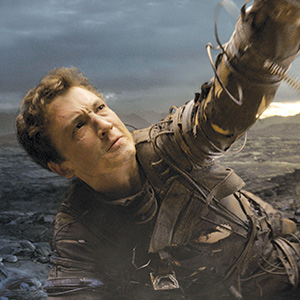

That Fantastic Four (2015) fails, reeks and sucks on ice should not be a matter for equivocation. Nor should there be equivocation about how this tentpole was made. It was made to exercise a studio’s option before it expired, rather than because there was a crying need to rephrase (for an un-fantastic, fourth time) the legend of Earth’s strange champions.
To those at their first rodeo: this is the interminable origin story of this quintessential comic book quartet. There’s the stretchable Mr. Fantastic, Reed Richards (Miles Teller of Whiplash), and his put-upon squeeze, Sue “The Invisible Girl” Storm (Kate Mara); muscle is supplied by the heavy-hearted NYC prole Ben “The Thing” Grimm (Jamie Bell), a monster of living rock; and the hotheaded Johnny Storm, the Human Torch (Michael B. Jordan), makes it a foursome.
The colorful crew is bled of hue in this film’s spare-the-air day colors. Even tropical Central America, seen in one of the film’s rare exterior shots, is the shade of used motor oil. Under the direction of Josh Trank (of the homebrewed superhero movie Chronicle), this somber “dark” tone takes polychrome kid fodder and turns it into a gloomy YA novel. Once again, mean, conspiring adults—military hobgoblins, dream-crushing teachers, lock-step money men in black suits—thwart the perfectly formed genius of ever-so-slightly moody young people.
It praises youthful inspiration, but Fantastic Four is made with a passive, squishy spirit, as if no one wanted to venture an opinion of how it should be done. Example: the blocked Sue Storm, played by Mara, as a Claire Danes sulker, needs some music so she can concentrate while using her computer. “What kind of music?” “Any music.” No one wanted to commit to a tone. The ‘any’ music is Philip Glass and Marco Beltrami, and it does a requisite job of any-ness.
If it reminded us one more time of the importance of family, Fantastic Four would transform into Lilo and Stitch. The climactic battle on Earth Zero (which looks like Pinnacles National Park with forest fire skies) is, ultimately, a rock fight. The battlers literally throw rocks at each other—cataclysmically, telepathically—but rocks. Transformed by the powers of the other dimension, Kebbel’s Doom is not the majestic Dr. Victor Von Doom, a terrible worm in an iron cocoon, but an emo mope, a plastic figure with glowing eyeballs.
Isn’t there anything nice I can say about this? Reg E. Cathey is impressive in the role of Franklin Storm, the Dr. Xavier-like adoptive father of Sue and the natural father of Johnny Storm. Cathey has a credible look of horror at the first sight of his son in flames. The overtly racist fanboys whimpering about the rewrite of Johnny Storm as an African American could be mocked by a Salon-worthy essay of point-missing from the left: “White America, haven’t you burned enough young black men alive for your amusement yet?” It’s likely that the horror of lynching informs Cathey’s moving reaction to the sight of his transformed son.
Similarly touching is Teller’s look of pity to his childhood best friend Ben, now an animated heap of rubble, sans blue shorts and sans penis. Quite likable: Reed’s wan thumbs-up (“Is this thing going to work?”) in a selfie, in front of a model of his own version of Buckaroo Banzai’s interdimensional overthruster. The filmmakers stress that Ben Grimm is Jewish, which is correct; a favorite Chanukah meme here is The Thing in yarmulke and tallit, as drawn by Mr. Jack Kirby. Even before he’s turned to boulders, Jamie Bell shows Grimm’s grit as an undersized junkyard kid.
I’m fond of actresses who are not smilers. Mara’s put-upon approach in the part of Sue seems fresh, before it turns into a movie-length cello solo. Backstory has it that Sue was a war baby of Kosovar, which gives her a credible connection with Victor von Doom (it’s probably a short tank ride from Kosovo to Latveria).
Two touchy Eastern Europeans and one angry Jewish kid—if they wanted the film to stress that “with great power comes great misery,” why didn’t they give Bela Tarr the job? Even The Thing’s battle cry, “It’s clobbering time!” is pronounced in the tones of a husband announcing that he’s heading off to work on a Tuesday morning.
PG-13; 106 Mins.



